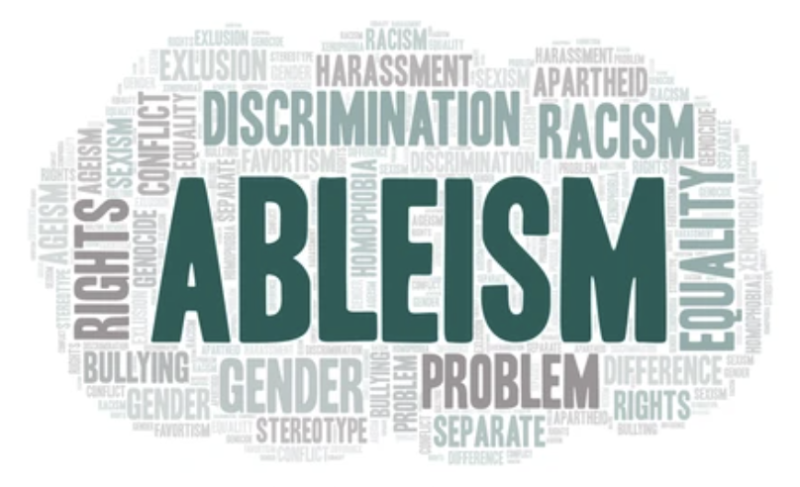
Enable disabled – Dismantle ableism in academia
Image source: https://www.shutterstock.com/search/ableism
6 min read
As a molecular biologist/ pharmacologist working with microscopic cellular models and reagents in volumes of microliter range, a slight jitter from my morning coffee can augment the challenges in performing certain lab work. The conduct of scientific benchwork often requires the use of all our senses, coordination, and fine motor skills. My recent close experience working with an intern who has visual impairment exposed my privilege of being able-bodied that many academics, and humans alike, often take for granted. Watching their struggles in performing a task that was technically easy for me but challenging for them hurt me viscerally. It was a first to me, as I soon realized that people around me throughout my academic life have been “able-bodied” and disability is generally not talked about. As a mentor for my intern, I was caught at wits’ end. How can I provide an inclusive, understanding, and supportive environment for them? How can I be their ally?
Why?
Ableism is endemic in academia. The academic ecosystems intrinsically expect an academic to be able-bodied and functional at all times. Incessant productivities are therefore normalized in this hostile environment that inherently assumes every academic is healthy and well. Disability may result in situations that affects productivity, thus easily leads to othering and marginalization. Besides physical or visible disability, individuals with invisible disabilities like neurodivergences, depression, colour blindness, dyslexia, or other chronic conditions, may “fit into” the ableist academic settings. For many of the invisible disabilities, individuals can develop strategies to help them cope in various settings and make adjustments at their workplace according to their needs. For example, a neurodivergent person with hypersensitive audio sensory could have noise-canceling headphones handy to avoid situations where there are loud noises. However, while managing the fluctuations of their own conditions, they may or may not have a choice to disclose their disability. And if given the choice, individuals may not disclose their conditions or needs due to their fear of stigmatization and discrimination from the negative labeling. Yet, a full disclosure isn’t a better option either. Without conscious awareness and understanding, their peers and work conditions may still overlook or even ignore their needs. Disclosure is a very sensitive and private event, that many disabled individuals do not feel safe, especially in academia, to share their disabilities and specific needs.
Marginalization of disabled people in academia is very complex. Coated under the societal understanding of what is “normal”, disabled academics not only measure themselves against the societally acceptable, standardized norms but also against their internalized criteria of disability. Individuals who do not carry an obvious visible identifier of their disability, for example a missing limb, are commonly assumed as abled. They are often seen as not being disabled enough for their conditions to be recognized of their disability. As a result, individuals with disabilities face secondary marginalization for their differences among disabled academics. Because of the ableist mindset and practices entrenched in academia, the diversity of disability and continuum of disabling conditions are rarely acknowledged.
How?
It is difficult to challenge the prevailing conceptualizations of normality and able-bodiedness that are institutionalized in academia, and in society at large. Juxtaposed with a second intern who doesn’t have visual difficulties, I was shameful of feeling a sense of relief. I quickly learnt to assign tasks according to their abilities, not their disabilities, with consensual agreement among my small team of three. I have not lived the experience of having chronic illness and disability while being in academia. But as allies and advocates, it is important to have an open communication and conscious awareness and understanding of our peers’ needs. Constant efforts in sending clear messages on equality and inclusivity is necessary to improve everyone’s experience in the physical space within and outside of the lab. By having flexible and adaptative ways of working, a supportive and accessible learning environment can be created for all students. On this note, mentorship trainings should be provided to all supervisors and staff with focus on understanding disabled experiences and ways to support, value and enable everyone and their contributions.
In the long run, academics need to shift their ableist attitudes and perspectives. Unfortunately, the transformation is still sluggish. As a referee for my intern’s PhD applications, I witnessed apparent discrimination against their visual disability which led to rejection of a PhD position. To end, I would like to quote: “the problem is not the disabled person; the problem is the way that normalcy is constructed to create the ‘problem’ of the disabled person” (Vehmas & Watson, 2014). Certainly, it is myopic to understand and address inequalities and disadvantages in academia without considering other intersectional status categories like gender, sexuality, wealth, language, citizenship, skin colour, body size, education, etc. Expanding beyond a single axis paradigm in research, policy, and systemic efforts is crucial to create a better working climate for all academics.
Et cetera
Click on the links below for some useful articles on this topic:
queerioushazel
Queer | Vegan | Scientist studying aging | Exploring writing | Curious about everything

0 comments